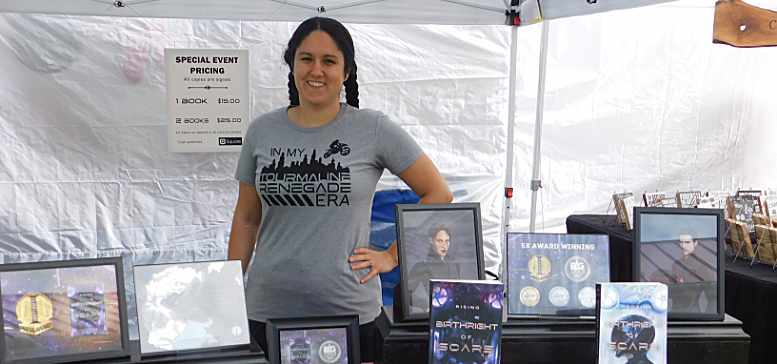Book Festival Best Practices
Teresa and I were asked for advice for new authors attending an inaugural book festival on how best to behave and market themselves and their books. We came up with this list of book festival best practices that’ll help present the best part of you, impress customers, and maybe lead to a few sales.
We want you, dear authors, to have a successful event, meet a lot of readers, and consider participating in future events that we sponsor.
We asked a friend of the festival for tips on how authors should prepare and present themselves to make the best impression on the visitors. With her husband, she has self-published more than 35 books and has sold books at festivals, craft fairs, library events, and more. She has seen the good, the bad, the sad, and the ugly!
If this is your first book festival, these tips will help you have a better event. Even if you’re an old hand, you may pick up a tip or two.
Ready?
Before the Event

* Rehearse speaking a sentence or two about each book. When a potential reader asks, “What is this book about?” you’ll be ready. Expect to repeat yourself throughout the day but remember: What you’re saying is new to each person you say it to. Don’t sound bored. Keep your energy up.

* Bring plenty of books. If you’re not sure, try at least six copies of each title. If you have a series, bring more copies of the first book; readers like starting a series at the beginning.
* Bring swag. Swag can be bookmarks, business cards, keychains, catalogs, pens with your logo, or fliers. The sky’s the limit depending on what you want to spend. We suggest bookmarks, because they can be given to a visitor after they listen to your pitch and want to move on. Bookmarks are inexpensive advertising.
* What are you going to wear? Your clothes advertise who you are as a writer. Don’t dress like you’re cleaning your garage. If you’ve got brand colors, wear them. Your outfit can reflect your genre: cowboy hat for your western romance, a trench coat for your thrillers, and so on. A distinctive outfit that reinforces your genre will help readers remember you and will give them something to talk about. People judge your books by their covers; they’ll judge you by your clothes too.

At the Event
* Arrive early. Give yourself enough time to set up your table and introduce yourself to your fellow authors. This is a great opportunity to share information and build relationships. Take notes on how they present their books. Be inspired by their work.
* Look over the program to see who else is attending. Know where the bathrooms and food trucks are. One way to easily engage with people is to help them with directions. If a person isn’t interested in your books, they may be interested in a fellow author’s books. Tell them!
* Understand that you may not sell a single book. There are no guarantees. Book festivals are advertising, marketing, publicity, and outreach. You’ll connect directly with readers, one on one. If you make one new fan, you’ve succeeded.
* You will handle your own sales. Be ready to make change or use a program like Square on your phone for credit card transactions. Display a price list for your books. You are responsible for any state sales tax so keep track of your sales.
* Put your phone down. This should be obvious, but we’ve seen this many times at events. People walk by your table, see you flicking through Instagram and walk on. Checking your email should be postponed. Calling home? You know your family requirements but try to minimize it. Posting about the event, live, to your social media? A great idea but the guest in front of you is more important. Otherwise, leave the phone alone other than to process credit card sales.
* Don’t be rude to the other authors, event organizers and volunteers, and the guests. If it irritates you to answer the same question for the 15th time, this may not be the place for you. If you offend a guest, you haven’t offended one person and lost one sale. You’ve offended every person they tell about your rudeness. What’s more, you won’t get invited back next year.
* Be ready to meet readers who have never heard of you. Be charming, personable, and prepared to answer their questions. Remember that each person is meeting you for the first time. If they ask about your books, tell them as if it’s the first time you were asked.
* Wait until the end of the event to pack up. If guests arrive in the last twenty minutes, we want them to see every author listed in the program.
* Again, don’t play on your phone and ignore the guests!
* Enjoy the day!
After the Event
* Keep track of your sales. You’ll need to report the income to the IRS, and pay the sales tax on each purchase to the state. Check with the state or your tax preparer. Recording your sales will also give you a better idea of how many books to bring to future events.
* Think about other author displays you saw. How can you improve your own table?
* Think about your pitches to passersby. How can you improve what you say about each of your books?
* Learn from this book festival. What will you change to be better next time? Because there will be a next time!
